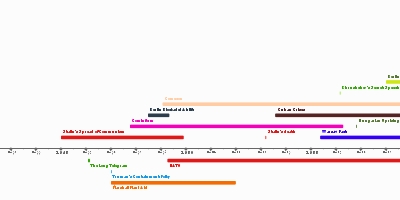Afghanistan and end of Détente (24 dic 1979 anni – 1 feb 1989 anni)
Descrizione:
Background• In 1977, Carter became US president. He was a democrat and had a different view on USA foreign relations. He criticised the USSR for its human rights abuses.
• Between ’77 and ’79 the USSR began to replace its out-of-date nuclear weapons in Eastern Europe with new ones. This led many in the west to believe that the USSR had not abandoned the idea of nuclear war and expansionism.
• The USA responded to the new nuclear weapons in eastern Europe by developing cruise missiles and deploying its own nuclear weapons to Europe.
• The Arms race was flaring up again. After the Soviets invaded Afghanistan on Christmas Eve 1979, the US congress refused to ratify SALT 2 because they could see the USSR had broken its commitment to limiting the creation of new nuclear weapons.
The leading up to the invasion
• Moscow supported a communist government led by Taraki when it seized power in Kabul in April 1978.
• Many ordinary Afghans rejected the communist government as its atheism was at odds with their Islamic faith. The communists imprisoned, tortured, and murdered many Muslim religious leaders. This would lead to the formation of the Mujahideen.
• In September 1979, a different Communist Afghan politician – Amin – arranged for the murdered of Taraki and seized control of the nation.
• Amin would immediately enter discussions with the USA.
• The USSR was alarmed and did not want US influence on their southern border, thus on 24th December 1979, Soviet troops would invade.
The invasion (24th December 1979)
• Amin was assassinated on 27th December and a pro-Soviet leader, Babrak Karmal, was installed.
• The Soviet army was ill-prepared for the desert and mountain landscapes. In contrast, the Mujahideen had expert local knowledge and utilised the topography to their advantage.
• The Mujahideen were extremely motivated as they saw it as a fight for their homeland and religion against a foreign invader.
US Response
• The US funded and supported the Mujahideen as they saw the situation as an extension of the Cold War. Including giving anti-aircraft missiles, hurting the only Soviet advantage. This led to the Supreme Soviet of the USSR refusing to ratify SALT 2.
• US planned to increase military spending by 5%.
• The Carter Doctrine – Believing that the USSR invasion of Afghanistan could threaten US interests in the Persian Gulf, Carter announced in his ‘State of the Union Address’ the Carter Doctrine on 23rd January 1980.
• The US would expand its policy of containment to the Middle East.
• The US was prepared to use force to stop any country from gaining control over the oil-rich states of the Middle East.
• Along with this, Carter forged an alliance with China and Israel to support the Mujahideen against the USSR. The CIA also secretly provided the Mujahideen with weapons and funds.
• The US imposed economic sanction on the USSR and abolished most trade between the two nations – leading to a rapid deterioration in relations.
• In 1980, the USA boycotted the Moscow Olympics. In return, the USSR boycotted the 1984 LA Olympics.
The conclusion of the invasion (’88 - ’89)
• The war became the USSR’s Vietnam. It was expensive and embarrassing.
• Many casualties on both sides, which led to increase internal opposition.
• It continued until 1988 when General Secretary Mikhail Gorbachev signed a deal to end the war and the last Soviet troops left in February 1989.
Aggiunto al nastro di tempo:
Data:
24 dic 1979 anni
1 feb 1989 anni
~ 9 years
